The Israeli army closed the city of Jericho on one of the busiest tourist days of the year. We spent hours waiting outside the checkpoint.
“Do you go to the demonstrations?” a friend asked me, referring to the weekly demonstrations in Israeli cities against the right wing government’s proposed changes to the Israeli system of governance. I had participated in just two demonstrations. In January I brought my children, nine year-old Forat and five year-old Adam, to the second demonstration, in Jerusalem. Forat and I prepared a sign: “There’s no democracy unless we dismantle apartheid.” At the last minute, though, I left the sign in the car, because I didn’t want to expose the children to negative reactions from the other demonstrators. I left Tel Aviv 11 years ago, to live with my partner Osama in the Ramallah area, and the gap between my old life and the current reality, of family life in the occupied West Bank, seems to widen every year.
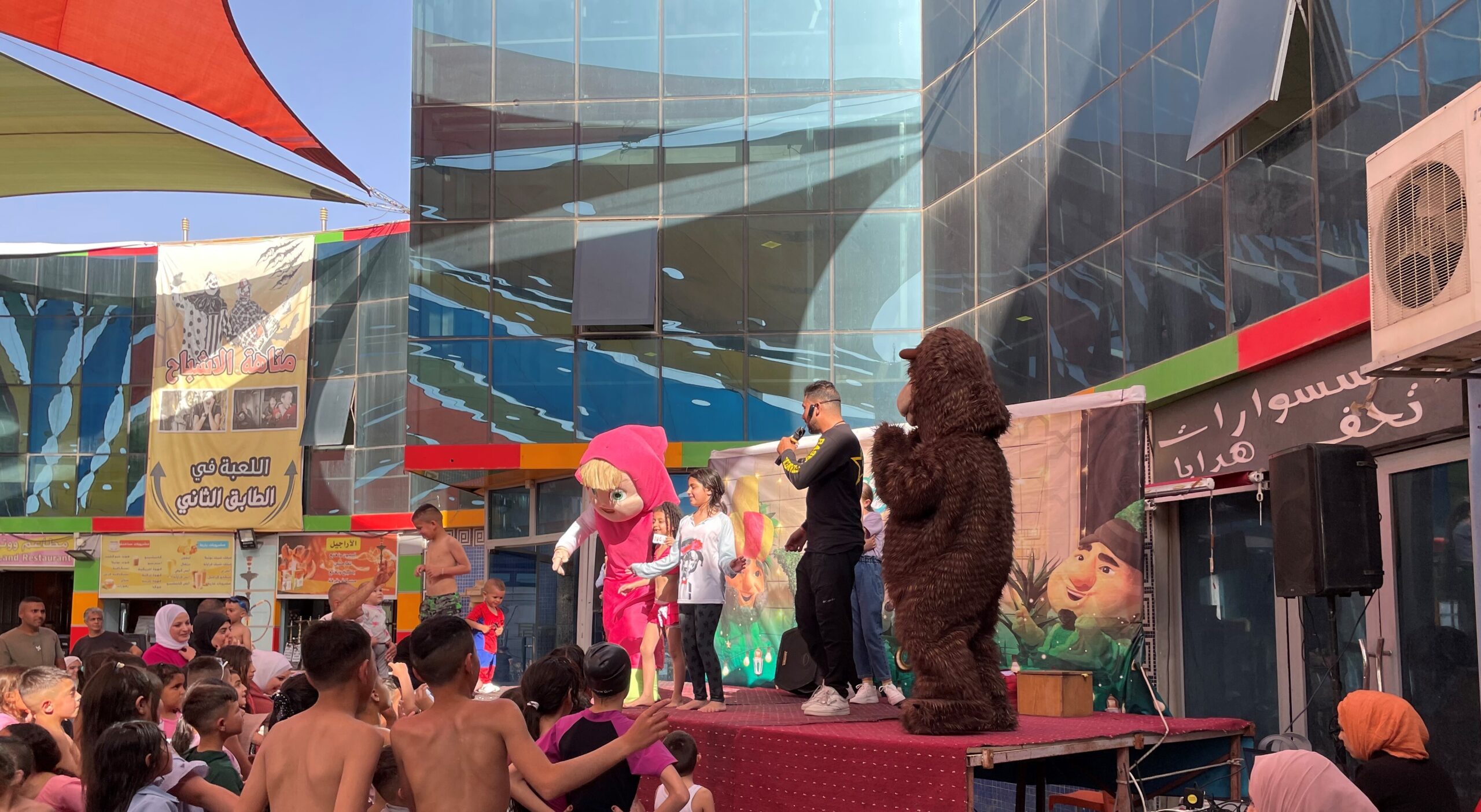
On Saturday, the second day of the Muslim holiday of Eid al Fitr, Osama and I took the kids to Jericho. Forat and Adam slid down the water slides at the water park, swam in the pools and watched a children’s show by a magician and two huge cartoon characters who led the children in dance and song. Afterward, we went to a restaurant that featured a playground in its courtyard. “Kul ‘am wa intu bi’khair,” the waiter said, offering us the traditional holiday greeting. He wrote down the children’s order: pizza, chicken fingers and French fries. A singer, accompanied by a guitar player and keyboardist, wove in and out of the tables, microphone in hand, crooning popular Arabic songs : “Send me a letter, let me know that you’re OK.”

“Who here’s from Tamra?” the singer asked, and the crowd whistled and clapped. “Kalanswa?” he continued, naming Palestinian cities in Israel and the West Bank. “Nablus? Jaffa? Nazareth? Jerusalem? Welcome to Jericho!” The holiday marked the opening of Jericho’s tourist season, during which tens of thousands of Palestinians from the West Bank and Israel crowd into the city’s amusement parks, swimming pools and hotels.
Throughout the day, we followed reports of checkpoints that the Israeli army had erected at the exits from the city. The closure turned Jericho into a gilded cage, of recreation and fun for the children, but we had no idea if we’d be able to get home at the end of our outing. We paid the dinner check and drove toward the city’s northern exit. The traffic stopped about a kilometer from the military watch tower at the edge of the city. To our right, visitors were still screaming in delight as they rode the rollercoaster at Banana Land. It was 8:30 pm. We waited. Cars began leaving the line and turning around, driving back into the city. I motioned to one of the cars passing us to stop. “What’s going on up ahead?” I asked. The driver turned out to be the father of a girl Forat knew from kindergarten.
“Sleep in Jericho,” he suggested with a smile. “We’re not going to make it out tonight.”
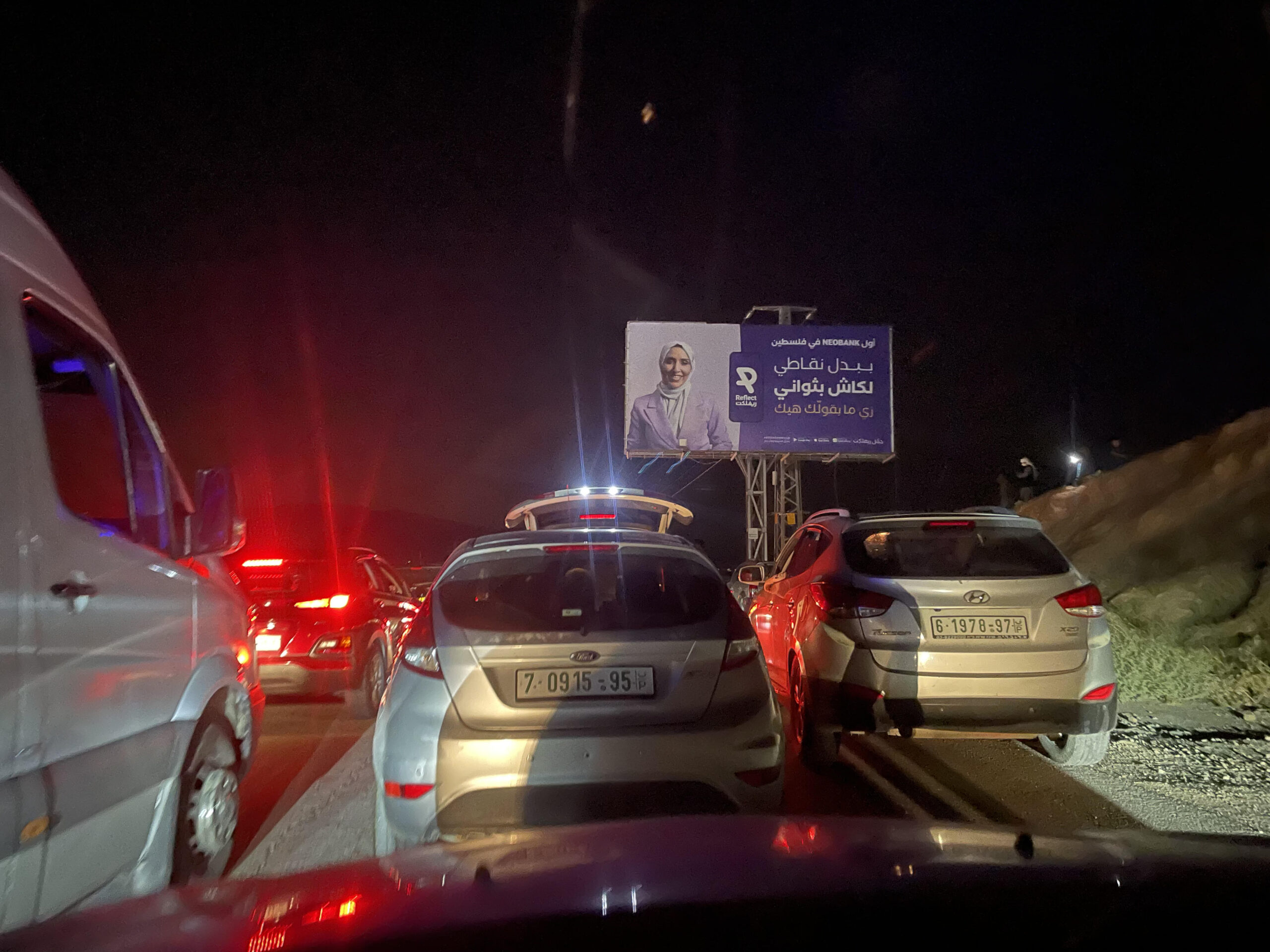
Hundreds and then thousands of cars joined the line to reach the checkpoint. The diners from Tamra, Kalanswa, Jaffa and Nazareth wanted to go home, too. Drivers passed us, trying to get to the front of the line, and they formed three lanes instead of one, blocking oncoming traffic from the opposite direction. I turned off the motor. Despite their frustration, people maintained a holiday atmosphere. Drivers turned up the volume on their radios, brought tobacco water pipes out of their cars and passed around bags of sunflower seeds, smoking and eating. We let Adam and Forat climb to the roof of our car from the open windows, and they moved their bodies to the rhythm of the music.
“Ima, why did the army lock us in?” Adam asked. Forat answered him: “Because they’re stronger than us, and they can.” When did Adam start asking questions like that, and when did Forat learn to answer them?
An hour passed. I called a journalist friend and asked her to ask an army official if and when the military would let people leave the city. The official told her that because of intelligence warnings, they were carefully checking people leaving Jericho. I left the car motor off. Osama checked Palestinian news sites, but all they said was that the city was closed. The Israeli news sites made no mention of Jericho – their journalists were busy reporting on the large-scale demonstrations against changes to the Israeli governance system, the largest of which was being held in Tel Aviv: “De-mo-cracy! De-mo-cracy!” the protestors chanted each syllable.
Young people who walked back from the head of the line brought us news: “There are four female soldiers, and they’re letting one car through about every ten minutes. Then they close it again.”
It was 10:30 pm. We considered our options. “I want to sleep in a hotel!” Adam rejoiced.
“Judging by the number of people trapped here, we’ll be sleeping on the floor of a mosque,” Osama replied. Forat climbed the ridge on the side of the road and returned with thorns stuck in her foot and blood dribbling down her flip-flops. The children complained that they wanted to go home. At 11 pm, they fell asleep.
Three hours passed, and we had advanced 300 meters. Mothers and fathers, equipped with wet wipes, brought their daughters and sons to the side of the road to relieve themselves. Every 15 minutes, I turned on the car and drove about 20 meters. Some of the young people continued to dance and play loud music. Older men walked together on the ridge, discussing the situation.
After six hours, we approached the military watch tower. Young Palestinian men handed out containers of water and tried to prepare us for an efficient checkpoint experience.
“My sister,” one of them told me through the open car window, “Keep left, we’ll move all the yellow cars there.” He was referring to the cars with Israeli license plates, driven by Palestinian citizens of Israel and residents of East Jerusalem.

At 3 am we reached the checkpoint. Three female soldiers and one male soldier stood next to concrete blocks, inputting ID numbers into digital tablets. The fourth female soldier leaned on a concrete block about two meters from the line of cars, her body tense, and she kept her weapon pointed at us the entire time. Another young Palestinian man told me to turn on the light in the car, to spotlight Forat and Adam sleeping in the back seat.
“This one’s a family!” he called to one of the soldiers, and she let us pass without checking ID cards. After waiting for six and a half hours, we left Jericho and continued the drive home.
“The Israeli army knows the economic significance of tourism for Jericho,” Osama said as I climbed the hairpin turns in the hills leading out of the desert and into Ramallah. “Businesses here wait for this holiday all year.” The military maintained the closure in the days that followed our visit, and according to Palestinian news reports, the tourist sites, which had been bustling with visitors on Saturday – emptied out.
The sign Forat and I had made remained in the trunk of my car: There’s no democracy unless we dismantle apartheid.
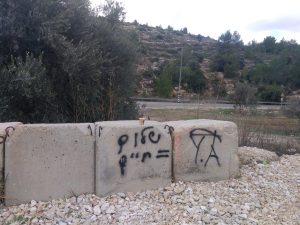
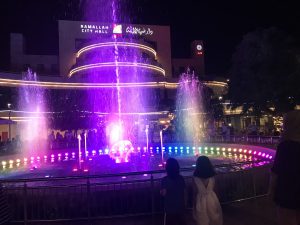
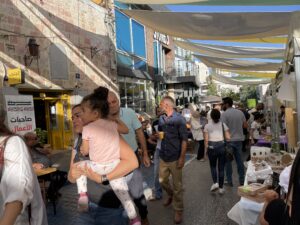
Thank you so much for re-starting your blog Umm Forat. I have missed your posts and wondered how the “democracy” movement in Israel looks from the West Bank.
Thank you, Anne!
אני ישראלי בן ישראלי וישראלית דור שני לתקומת העם היהודי, מסתכל בראי ומתבייש במה שנהיינו
תודה, אבי.
סכריני מדאי.
המונחים ״פשע המלחמה״, ״ציוני-מדיני״ ו״יישובי/קולוניאלי״ חסרים במשפט ״הפער בין חיי הקודמים למציאות הנוכחית, של חיי משפחה בגדה המערבית הכבושה [במעשה פשע המלחמה הציוני-מדיני/יישובי קולוניאלי] – מתרחב משנה לשנה״
תודה, אורי.
So glad to see your blog again. So sad to see what the Israelis are doing to deliberately make life difficult for those who aren’t Jewish.
Yes, it is apartheid.
Thank you, Jan.
שרי יקרה,
לא נתת לי לחכות הרבה זמן…
כל ה״חווייה” שעברתם ביריחו היא הרוע בתמציתו, בשם מה שנקרא ״בטחון״ מבצעים צה״ל, משמר הגבול, המשטרה פשעים נגד האנושות, יום יום ובכל מקום בשטחים הכבושים (ובנגב) והמאבק על הדמוקרטיה לא יצלח לפני שישראל תהפוך למדינת כל תושביה והעם הפלסטיני יזכה לחופש ולזכות להגדרה עצמית!
אני מלא צער ובושה
שלכם בידידות
יהודה (שבדיה)
תודה, יהודה!
Welcome back
זו היא רק ההתחלה למה שיקרה אם הימין הקיצוני יצליח בתוכניתו.
וזה יהיה לא רק בשטחים
תודה, יוכי.
שרי, את כותבת מקסים ורגיש וכה כנה ואני מצד אחד ממש אוהבת ונהנית לקרוא אותך תמיד ומצד שני חשה בושה גדולה ועצבות על מה שאת ואתם נאלצים לעבור מדי יום ובעיקר יש בי תחושת אשמה על הכיבוש שלצערי – אני כאזרחית ישראלית – חלק ממנו. שולחת חיבוק
תודה, טלי!אין צורך באשמה כשלוקחים אחריות :). תודה על מי שאת.
What a shame, 3 million people are hostages of 400,000 illegal settlers.
Thank you, Pinni.
Simply an excellent article. You cannot make this up. Reality demonstrates so vividly the tyranny of Evil. How on earth will the New Age handle peace & prosperity? It should be very funny to watch. I bet I am too busy to watch much. I have too many projects ahead of me.
Sandy Rinaldi, Arkansas, US Army veteran 1971 to 1974, today 29 APR 23
Thank you, Sandy.
הצטרפי אלינו להפגנות בתל אביב עם הגוש נגד הכיבוש. “אין דימוקרטיה עם כיבוש”, עם דגלי ישראל ופלסטין, זה על יד זה. נצליח רק אם נהיה רבים. Join us to the demonstrations in Tel Aviv. No Democracy with Occupation. Israeli and Palestinian flags together. We must be many to succssed
תודה, אבי. ותודה על הפעילות החשובה שלך.
Welcome back.
I’m 79. I hope I live long enough to see the end of the Occupation.
Where can I buy a Palestinian flag?
Thank you, Jennifer! Depending on where you live, online stores carry them: https://www.amazon.com/palestinian-flag/s?k=palestinian+flag
תודה אום פורת על השיקוף, עצב עמוק על מה שנהיינו.
דניאלה
At the demonstations there are signs like ” Democracy and Occupation cannot coexist”. But before the rightwing government came to power nobody organized demonstrations against the Occupation. The whole meaning of Democracy should be newly defined. Can a Jewish State be Democratic?
I love your blog, Umm Forat!
Stay strong!
Hartmut Jokisch
Council-member of Bad Oldesloe and Municipal Commissioner for the sister city Jifna